

Tubequizard. Cinematic: "Safe Haven" World of Warcraft Grammar for listenersFilm & animation14 items Simple tenses.

Watch this World of Warcraft cinematic and practice catching expressions in present simple, past simple and future simple. Black Mirror: Season 5 | Official Trailer | Netflix Netflix. Comparatives Quiz. CONJUNCTIONS. <b>This page requires a JavaScript-enabled browser</b><BR>Instructions on how to enable your browser are contained in the help file.
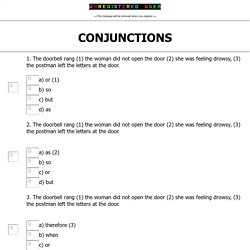
<BR> UNREGISTERED USER <<This message will be removed when you register >> This is more feedback! This is the feedback! <b>This page requires a JavaScript-enabled browser</b><BR>Instructions on how to enable your browser are contained in the help file. UNREGISTERED USER <<This message will be removed when you register >> Irregular Verb Wheel Game - Languages Games. 74 Irregular Verbs. English ESL worksheets, activities for distance learning and physical classrooms (x90421) Question words. We use the question words who (for people), what/which (for things), when (for time), where (for places), why (for reasons) and how (for more details). What do I need to know about question words? I know you know the basics, but questions are quite tricky.
Let’s just go over the main rules. We usually form questions by putting an auxiliary verb, or a modal verb, before the subject. Does it suit me? When the verb 'to be' is the main verb, we don’t use auxiliary verbs. Is Oliver there? Prepositions of Time - at, in, on. We use: at for a PRECISE TIMEin for MONTHS, YEARS, CENTURIES and LONG PERIODSon for DAYS and DATES Look at these examples: I have a meeting at 9am.The shop closes at midnight.Jane went home at lunchtime.In England, it often snows in December.Do you think we will go to Jupiter in the future?
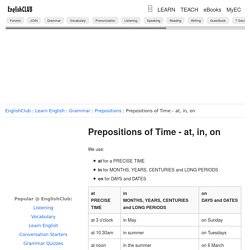
There should be a lot of progress in the next century.Do you work on Mondays? At nine o'clock on Monday. Prepositions of time. Daisy: Hi, Mum, How's it going?
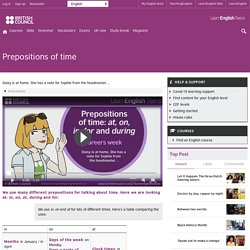
Sophie: Fine thanks, honey. How was school? Daisy: Good. Quiz your English. Key features: Go head-to-head with other players from around the world, challenge your friends through social media, and quiz your English language skills.Battle it out over a range of general English topics and grammar, or brush up ready for your test by selecting an exam-specific topic.Earn Achievements as you progress - how far can you go?
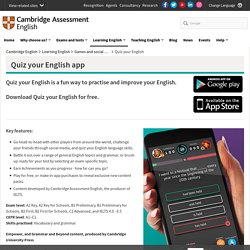
Play for free, or make in-app purchases to reveal exclusive new content packs.Content developed by Cambridge Assessment English, the producer of IELTS. Asking Questions in English. The Word Order in Questions. Word order - questions.wmv. Learn All Irregular Verbs in One Song.
Learn English ESL Irregular Verbs Grammar Rap Song! StickStuckStuck with Fluency MC! English irregular verbs - practise 120 irregular verbs in Past Simple with sentences and pictures. Watch grammar videos. Irregular Verb Wheel Game - Languages Games. Daily Routines : Adverbs of frequency - English Language. Perfect English Grammar. EngVid. Perfect English Grammar. English Superlatives - Quiz - Fun ESL Games. Conditional type 1 animation. English Superlatives - Quiz - Fun ESL Games.
English grammar + Exercises + PDF. Passive voice - board game. I love playing games with my students.
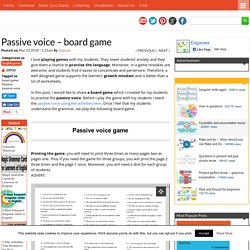
They lower students’ anxiety and they give them a chance to practise the language. Moreover, in a game mistakes are welcome, and students find it easier to concentrate and perservere. Therefore, a well designed game supports the learners’ growth mindset and is better than a lot of worksheets. In this post, I would like to share a board game which I created for my students to practise the passive voice. Before I play the game with my students I teach the passive voice using the activities here. Printing the game, you will need to print three times as many pages two as pages one. My students usually play the game in groups of three or four. The student who gets to the end first is the winner.
First conditional - grammar explanation for learners of English. First conditional is very similar to time clauses.
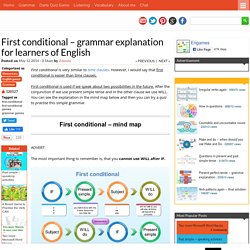
However, I would say that first conditional is easier than time clauses. First conditional is used if we speak about two possibilities in the future. After the conjunction IF we use present simple tense and in the other clause we use WILL. You can see the explanation in the mind map below and then you can try a quiz to practise this simple grammar. First conditional – mind map The most important thing to remember is, that you cannot use WILL after IF. Conditionals. We use conditional sentences to say one thing depends on another.
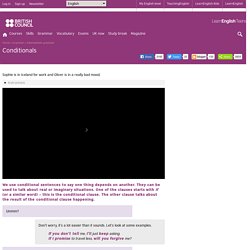
They can be used to talk about real or imaginary situations. One of the clauses starts with if (or a similar word) – this is the conditional clause. The other clause talks about the result of the conditional clause happening. Don’t worry, it’s a lot easier than it sounds. Let’s look at some examples. If you don’t tell me, I’ll just keep asking.If I promise to travel less, will you forgive me?